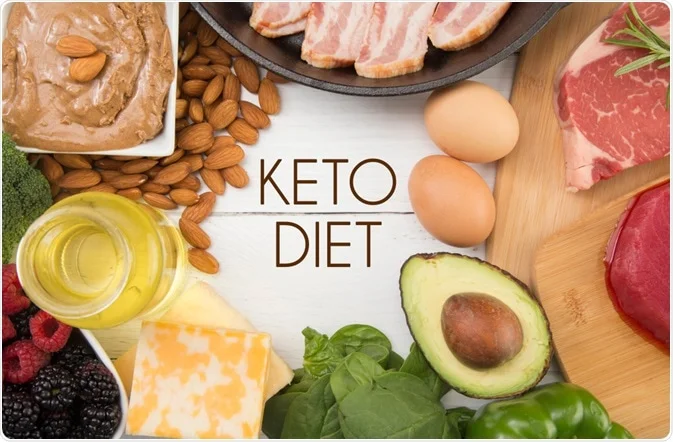What is Keto Diet?
What is Keto Diet?
The keto diet plan is an extremely low-carb, high-fat eating regimen that shares similarities with the Atkins diet. The keto diet revolves around drastically reducing your intake of carbohydrates and increasing the intake of fats. This metabolic shift is known as ketosis, the state from which the keto diet plan gets its name. During ketosis, your body becomes incredibly efficient at burning fat for energy instead of carbs.
In addition to burning fat, the keto diet transforms fat into ketones in the liver, which provides a sustainable energy source for the brain. The keto diet plan has shown significant benefits, such as lowering glucose levels, improving insulin sensitivity, and increasing ketones, leading to multiple health advantages.
The Benefits of the Keto Diet Plan
Research has demonstrated that the keto diet plan is far more effective for weight loss than other widely recommended low-fat diets. One of the main advantages of the keto diet is that it keeps you feeling full and satisfied, meaning you won't feel like you're starving yourself. As a result, you can lose weight without constantly monitoring calorie intake.
One study found that people on a keto diet lost 2.2 times more weight than those following a calorie-restricted, low-fat diet. Another study revealed that individuals on the keto diet plan lost three times more weight than those on the Diabetes UK-recommended diet. The growing popularity of the keto diet is not only due to its weight loss benefits but also because it improves overall health and reduces the risk of metabolic diseases.
Key Points to Consider Before Starting the Keto Diet Plan
The keto diet plan focuses on minimizing carbohydrate intake, with a target of less than 30 grams of carbs per day. Your meals should include items like meat, cheese, eggs, nuts, oils, avocados, oily fish, and cream. Since these fat sources are high in calories, you should balance them with low-carb vegetables.
Planning your meals and snacks ahead of time is crucial since low-carb food options may be hard to find on the go. Additionally, the keto diet affects fluid and mineral balance, so it's essential to add enough salt to your diet and possibly take electrolyte supplements.
For those seeking quicker results, ketone salt supplements can help increase the ketone levels in your body and accelerate ketosis.

What to Eat on a Keto Diet Plan for Weight Loss
Examination shows that the Keto diet Protein and fat are the staples of the keto diet. As a result, meat such as red meat, steak, ham, sausages, bacon, chicken, and turkey play a critical role in the keto diet plan. Fish such as salmon, trout, mackerel, and tuna are also excellent choices.
Dairy products are an important part of the keto diet plan. Foods like cheese, butter, and cream provide essential fats. Additionally, nuts and seeds, including almonds, pecans, flaxseeds, and pumpkin seeds, are key components of this meal plan.
Low-carb vegetables like leafy greens, tomatoes, onions, and peppers should also be part of your meals. To enhance flavor, you can add salt, pepper, and other healthy herbs and spices.
Food sources To Avoid in Keto diet for Weight Loss
When following the keto diet plan, avoid unhealthy fats like margarine and vegetable oils, as well as processed foods like fast food, packaged snacks, and processed meats.
Stay away from baked goods such as cookies, doughnuts, rolls, white bread, and even whole wheat bread. High-sugar foods, including ice cream, maple syrup, and various artificial sweeteners, are also off-limits.
It's also important to avoid sugary drinks like soda, juice, and sweetened teas, as well as high-carb vegetables such as potatoes, yams, corn, and peas.
Certain fruits like bananas, grapes, and citrus should be limited, and alcohol, especially beer and sweet cocktails, should be avoided.
Week 1
Meal 1: Green tea and almonds
Meal 2: Broccoli-capsicum sabji, bhindi sabji, palak-paneer sabji
Meal 3: Pre-workout fried nuts, butter
Meal 4: French beans sabji, tinda sabji
This meal structure ensures you stay in ketosis while eating a variety of low-carb, high-fat meals.
Conclusion: What is a Keto Diet Plan?
The keto diet plan is more than just a weight loss strategy. It's a holistic approach to health that reduces body fat, increases metabolism, and may even delay aging. The keto diet can improve overall health by managing blood sugar levels, improving insulin sensitivity, and reducing the risk of metabolic conditions.
Before starting the keto diet plan, it's essential to evaluate whether it suits your lifestyle and preferences. If you dislike high-fat foods or lean more toward a plant-based diet, the keto diet may be challenging to follow.
Remember, consistency is key when following the keto diet plan. By incorporating the right foods, such as meats, fish, dairy, nuts, and low-carb vegetables, you'll stay on track toward achieving your weight loss and health goals. Make sure to avoid high-carb foods and stay mindful of the food items that can throw your body out of ketosis.
By adhering to the keto diet plan, you can begin a journey toward better health, increased energy, and effective weight loss. Start today and commit to making your keto diet plan a lifestyle, not just a short-term fix.
Guides
- Benefits of Protein
- 7 Healthy Eating Habits
- 7 Most Effective Exercises At Home
- Home Workout Plan Without Equipment
- Top 10 Biggest Nutrition Myths
- How To Get Flexible Body?
- Weight Loss VS Fat Loss
- What is Keto Diet?
- What Is Minerals?
- What Is Digital Marketing ?
- Best Free Tools For Beginner You Tubers
- Best Teas For Weight Loss & Fat Burning
- Green Tea: Health Benefits And Side Effects
- Yoga for Weight Loss and Fat Burning
- What Is Type-2 Diabetes?
- How To Write Eye-Grabbing Resume
- The Ultimate Guide To Prepare For An Interview
- 10 Best Health Benefits Of Eating Mango
- healthy eating habits for kids
- 10 tips for starting your Fitness Transformation
- 10 Reasons Why People Hate Gym & How to Overcome Them
- Fuel Your Passion For Nutrition: Explore The Power Of A Nutrition Course
- Shed Pounds with Ease: Vegetarian Diet Plan for Weight Loss Revealed!
- Anabolic steroids: Types, Uses, and Side Effects
- Find Your Path to Success: Choosing the Right Fitness Certification Program in India
- learn gym trainer course offline at surat with best faculties
- Learn about Body Composition and How it Affects Your Health
- Nutrition course online with affordable fees
- Online Dietitian Plan vs In-Person Consultation: Which is Right for You?
- The Importance Of Fitness Education In Today's World
- How to find right fitness institute in india
- How to Actually Build Muscle When You Work Out
- Is Becoming a Gym Trainer in India Worth It?
- Why Online Dietician Courses Are in High Demand in India: A Practical Guide for Future Professionals
- 7 Powerlifting Training Mistakes Beginners Still Make & (How to Fix)
- Top 10 Evidence-Based Immunity-Boosting Habits to Stay Healthy in 2025
- What Can You Do After Personal Trainer Certification? Real Career Outcomes 2026
- Choosing a Fitness Coach Course That Actually Pays: The 2026 Guide
- Is your NSDC Fitness Certificate Valid in Dubai? The 2026 Guide for Indian Trainers
- 7 Fitness Trends 2026: What Experts Actually Predict
- 10 Types of Group Fitness Classes Near Me


About Dr.Gautam Jani
Dr. Gautam is a civil engineer. By passion he is a dietitian and had started practising it in the year 2016. He is the founder of fitnesswithgomzi firm established in 2018. He has achieved many certificate from ACSM, ISSA and VLCC.

